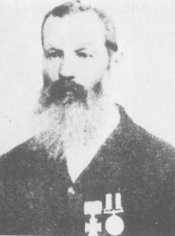Samuel Mitchell (VC)
| Samuel Mitchell | |
|---|---|

Samuel Mitchell
|
|
| Born |
8 September 1841 Aspley Guise, Bedfordshire |
| Died | 16 March 1894 (aged 52) Mikonui River, New Zealand |
| Buried | Ross Cemetery, Westland |
| Allegiance | United Kingdom |
| Service/branch | Royal Navy |
| Years of service | 1857–1865 |
| Rank | Boatswain's Mate |
| Unit | HMS Harrier |
| Battles/wars | Waikato-Hauhau Maori War |
| Awards | Victoria Cross |
Samuel Mitchell VC (8 September 1841 – 16 March 1894) was a Royal Navy sailor and a recipient of the Victoria Cross, the highest award for gallantry in the face of the enemy that can be awarded to British and Commonwealth forces.
Samuel Mitchell was born in Aspley in Bedfordshire, England, on 8 September 1841. His father was a labourer who later became a minister in a Wesleyan church. Mitchell joined the Royal Navy in 1857, shortly before his 16th birthday.
Mitchell served aboard HMS Crocodile and later the shore station in Portsmouth, HMS Excellent. In 1860 he was posted to HMS Harrier, which was destined for service on the Australian Station. Operating out of Sydney, the Australian Station area of operations encompassed both Australia and New Zealand.
In 1863, during the Waikato-Hauhau Maori War in New Zealand, the Harrier participated in an expedition up the Waikato River in support of British Army operations. Mitchell, who had been made captain of the foretop, was part of a naval brigade that was raised for service in the Invasion of the Waikato and which fought in the Battle of Rangiriri. By the end of the year, the fighting in the Waikato region had ceased but hostilities had shifted to Tauranga, and Mitchell's brigade moved there to participate in the Tauranga Campaign.
On 29 April 1864, a storming party of 150 marines and sailors, which included Mitchell and the captain of the Harrier, Commander Edward Hay, together with soldiers of the 43rd Light Infantry, succeeded in establishing themselves inside a fortified position known as the Gate Pa. Hay was wounded and despite being ordered to seek safety, Mitchell carried his commander to shelter. Although Hay died soon after from his wounds, he requested that Mitchell be recognised for his actions. Hay's senior officer, Commodore Sir William Wiseman, duly recommended him for the Victoria Cross (VC). The citation for his VC read:
...
Wikipedia
